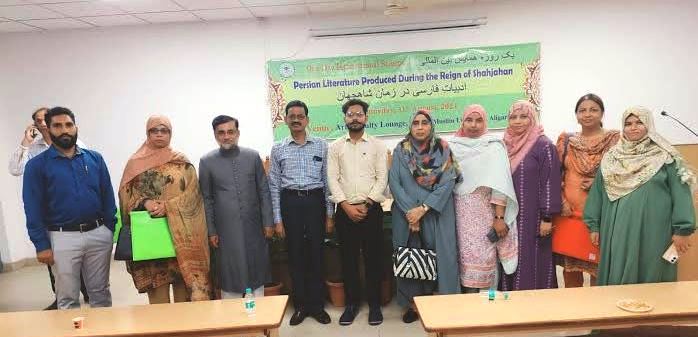Indo-Persian literature needs sustained scholarly attention; scholars emphasise
Aligarh : “The Indo-Persian literature produced during the reign of the Mughal emperor Shah Jahan has yet to receive the sustained scholarly attention that is commensurate with its vastness and significance. Interdisciplinarity would facilitate these scholarly endeavors and in the process Persian scholars could play a key role by editing the existing literary corpus”. This was the major conclusion drawn during the International Seminar on the theme “Persian Literature Produced during the reign of Shah Jahan”, held under the auspices of the Department of Persian, Aligarh Muslim University.
More than 40 papers were presented by the scholars, in-person as well as in on-line mode, on various themes.
In the valedictory session, Prof Rana Khursheed, Chairperson and Coordinator extended thanks to the delegates and the members of the organizing committee.
Prof. Iraq Raza Zaidi described how Persian verses written by the court poets were reproduced by the later tazkira nawis (writers of biography), such as the poetry written on the death of Mumtaz Mahall, and grief of Shah Jahan, her burial in Zainabad gardens across the Tapti River in Burhanpur as well as the other significant events in the life of the sovereign and his family.
The Mughal Persian literary culture was a transregional phenomenon in the early modern period as revealed in a paper presented by Dr. Amina Khatun (Assistant Professor in Bengali Language).
Prof. Ghulam Ashraf Qadri, (Gandhi Faiz-e-Am College, Shahjahanpur) discussed the contribution of nobles in urbanization such as the founding of the Shahjahanpur by the nobleman Bahadur Khan Chaghta, while Sarfaraz Ahmad Khan (MANUU, Lucknow) discussed the literary contribution of well-known court-patronized Munshi Chander Bhan Brahman and his literary oeuvre.
Mr. Umar Kamaluddin read fascinating pieces of topographical poetry mainly composed by the court poet Kalim Kashani who was one of the leading exponents of Indian style called sabk-e hindi.
Among the speakers, Professor Akhlaq Ahan (JNU) said Mughal Prince Muhammad Dārā Shukoh (1615-59) was a major protagonist of a complex and an extraordinary exercise in cross-cultural understanding, particularly during the last few years of his short life.

